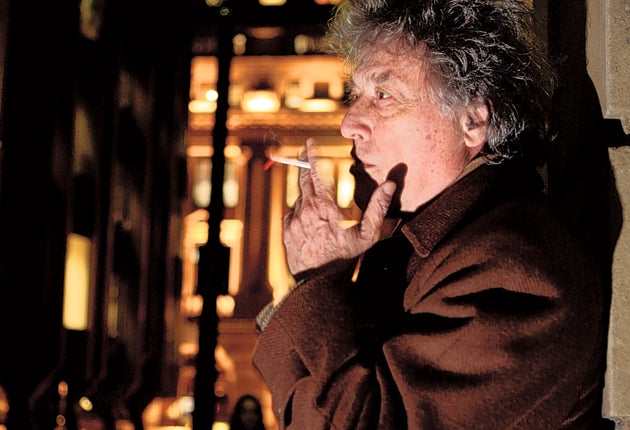Stoppard back on the BBC after an interval of three decades

Your support helps us to tell the story
From reproductive rights to climate change to Big Tech, The Independent is on the ground when the story is developing. Whether it's investigating the financials of Elon Musk's pro-Trump PAC or producing our latest documentary, 'The A Word', which shines a light on the American women fighting for reproductive rights, we know how important it is to parse out the facts from the messaging.
At such a critical moment in US history, we need reporters on the ground. Your donation allows us to keep sending journalists to speak to both sides of the story.
The Independent is trusted by Americans across the entire political spectrum. And unlike many other quality news outlets, we choose not to lock Americans out of our reporting and analysis with paywalls. We believe quality journalism should be available to everyone, paid for by those who can afford it.
Your support makes all the difference.Sir Tom Stoppard is to work with BBC television for the first time in more than 30 years, making a five-hour epic tale of the Great War which he hopes will revive the reputation of one of Britain's finest novelists of the early 20th century, Ford Madox Ford.
Madox Ford's tetralogy Parade's End, a four-novel story set in England and the trenches of the Western Front, has been adapted by Sir Tom into a screenplay, which is designed to be shown in five 60-minute parts and will be broadcast on BBC2. It is his first collaboration with the corporation for a generation, since such works as 1977's Professional Foul, the tale of a Cambridge don whose visit to Prague is hijacked by Communism.
Ben Stephenson, head of drama commissioning at the BBC, said that Parade's End was an "amazing" story and "not as classic as it should be". The dramatisation is central to a new strategy aimed at making BBC2 a home for multi-part drama series. "Tom Stoppard is without a doubt one of the world's finest writers and we are thrilled to welcome him to the BBC with his extraordinary, witty and hugely complex take on a complex work," said Stephenson.
The playwright has now completed the screenplay. The BBC is understood to be looking at a co-production arrangement, probably with an American broadcaster, with a view to filming next year.
Parade's End was published over four years between 1924 and 1928, as Some Do Not..., No More Parades, A Man Could Stand Up and The Last Post. It tells the story of Christopher Tietjens, a high-born civil servant who is sent to the front with the British Army and spends his time in the trenches pondering the complexities of his relationships with his socialite wife, Sylvia, and a suffragette called Valentine with whom he is having an unconsummated affair. The story is informed by Madox Ford's own experiences of fighting in France with the Welsh Regiment during the First World War.
Despite the scale of Parade's End it is not Ford Madox Ford's best-known work. The Good Soldier, set in the period immediately before the outbreak of the First World War, is often ranked as one of the greatest English novels of all time.
Madox Ford was born in France as Ford Hueffer, the son of a German music critic. His mother was the daughter of the Pre-Raphaelite painter Ford Madox Brown, from whom the novelist adapted his name.
Madox Ford, who died in 1939, spent the early part of the Great War working in the War Propaganda Bureau alongside other writers such as GK Chesterton and Hilaire Belloc.
Sir Tom, 73, has in recent years written mostly for cinema, composing the screenplays for the films Enigma, based on the Robert Harris novel, and Shakespeare in Love, for which he won an Academy Award. His theatre work is enduringly popular and The Real Thing is currently enjoying a revival at the Old Vic in London.
The playwright has been working on the Madox Ford project with Piers Wenger, the head of drama at BBC Wales and executive producer of Doctor Who and the remake of Upstairs Downstairs. Wenger is a big admirer of both Sir Tom and Parade's End, said Stephenson. "It's Piers Wenger's great passion project and he's worked with Tom Stoppard to make it a reality."
Wenger said: "Parade's End is Ford Madox Ford's masterpiece and the BBC is immensely privileged to have a dramatist of Sir Tom Stoppard's extraordinary calibre to bring it to life."
The production is being made by Mammoth Screen, a London-based company specialising in drama. Mammoth Screen's previous work includes an adaptation of Emily Brontë's Wuthering Heights for ITV, and Margot, a biopic of Dame Margot Fonteyn for BBC4.
Like Ford Madox Ford, Sir Tom took an anglicised name. He was born Tomas Straussler in the Moravia province of what was then Czechoslovakia and, after the death of his father during the Second World War, he inherited the surname of his stepfather, a British Army officer. He came to prominence in 1966 with the play Rosencrantz & Guildenstern Are Dead.
Join our commenting forum
Join thought-provoking conversations, follow other Independent readers and see their replies
Comments